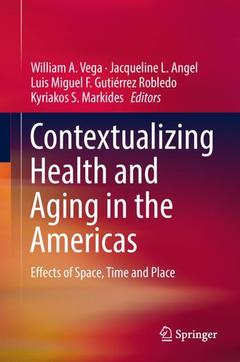Description
Contextualizing Health and Aging in the Americas, Softcover reprint of the original 1st ed. 2019
Effects of Space, Time and Place
Coordinators: Vega William A., Angel Jacqueline L., Gutiérrez Robledo Luis Miguel F., Markides Kyriakos S.
Language: English
Subjects for Contextualizing Health and Aging in the Americas:
Publication date: 10-2018
Support: Print on demand
Publication date: 12-2019
383 p. · 15.5x23.5 cm · Paperback
Description
/li>Contents
/li>Biography
/li>Comment
/li>
Part 1: The Role of Place and Environment.- Chapter 1. Population Aging and Health in Puerto Rico (Brian Downer).- Chapter 2. Regional Disparities in ADL Limitations among Older Latinos, Blacks, and Whites in the United States (William A. Vega).- Chapter 3. Importa Dónde Vivimos? How Regional Variation Informs our Understanding of Diabetes and Hypertension Prevalence among Older Latino Populations (Catherine García).- Chapter 4. Latino and Alzheimer’s: Social Determinants and Personal Factors Contributing to Disease Risk (Shinyi Wu).- Chapter 5. Cognitive Functioning of U.S. Adults by Race and Hispanic Origin (Carlos Díaz-Venegas).- Part 2: Place and Unmet Needs.- Chapter 6. Immigration Enforcement, Older Latino Immigrants, and Implications for Health (Nestor Rodriguez).- Chapter 7. Medicaid Long-term Community Care in California and Texas: A Growing Fiscal Challenge in a New Era (Jacqueline L. Angel).- Chapter 8. Strengthening Solidarity: A Theoretical Inquiry into the Roles of Civil Society Organizations in the Support of Elderly Citizens in Mexico City (Ronald J. Angel).- Chapter 9. The Magnitude of Health Inequalities among Older Adults in Brazil and Mexico (Flávia Cristina Drumond Andrade).- Part 3: Contextual Elements for Successful Aging.- Chapter 10. Lessons Learned from the Positive Minds – Strong Bodies Trial on Disability Prevention for Racial/Ethnic Minority Elders (Naomi Ali).- Chapter 11. Older Latinos’ Financial Security: Resources, Needs, and Future Prospects (Richard W. Johnson).- Chapter 12. Disability and the Immigrant Health Paradox: Gender and Timing of Migration (Marc A. Garcia).- Chapter 13. Limited but Not Disabled: Subjective Disability versus Objective Measurement of Functional Status and Mortality Risk among Elderly Mexican Americans (Phillip A. Cantu).- Part 4: Caregiving and Family Dynamics.- Chapter 14. Neighborhood Cohesion and Caregiver Well-Being among the Mexican-origin Population (Sunshine Rote).- Chapter 15. Population Aging inCuba: Coping with Social Care Deficit (Blandine Destremau).- Chapter 16. Determinants of Informal Care Supply for Older Adults in Yucatan, Mexico (Sean Angst).- Chapter 17. The Caregiving Experience of Older Mexican Americans and their Caregivers (David V. Flores).
Williams A. Vega is a Provost Professor at USC with appointments in social work, preventive medicine, psychiatry, family medicine, psychology and gerontology, and an elected member of the National Academy of Medicine. He is the Cleofas and Victor Ramirez Professor of Practice, Policy, Research and Advocacy for the Latino Population at the USC School of Social Work. Vega is also the Executive Director of the USC Edward R. Roybal Institute on Aging and an emeritus professor at the University of California, Berkeley, School of Public Health. An elected member of the National Academy of Medicine, Prior to joining the USC Roybal Institute, he was director of the Luskin Center on Innovation and an associate provost at UCLA.
Professor Vega has conducted community and clinical research projects on health, mental health and substance abuse throughout the United States and Latin America. His specialty is multi-cultural epidemiologic and services research with adolescents and adults — work that has been funded by multiple public and private sources. He has published more than 200 articles and chapters, in addition to several books. In 2006, the ISI Web of Science listed him in the top half of one percent of the most highly cited researchers worldwide in social science literature over the past 20 years, and currently listed in Research Gate in the top 2% internationally. He is the recipient of many awards including the Community, Culture and Prevention Science Award from the Society for Prevention Research, the Award of Excellence in Research by a Senior Scientist from the National Hispanic Science Network, in 2013 received the Rema Lapouse Award from the Mental Health, Epidemiology, and Statistics Sections of the American Public Health Association, an the Award for Lifetime Achievement from the Hispanic Behavioral Health Institute in 2013.
Jacqueline L. Angel is Professor of Public Affairs and Sociology and a Faculty Affiliate at the Population Res




